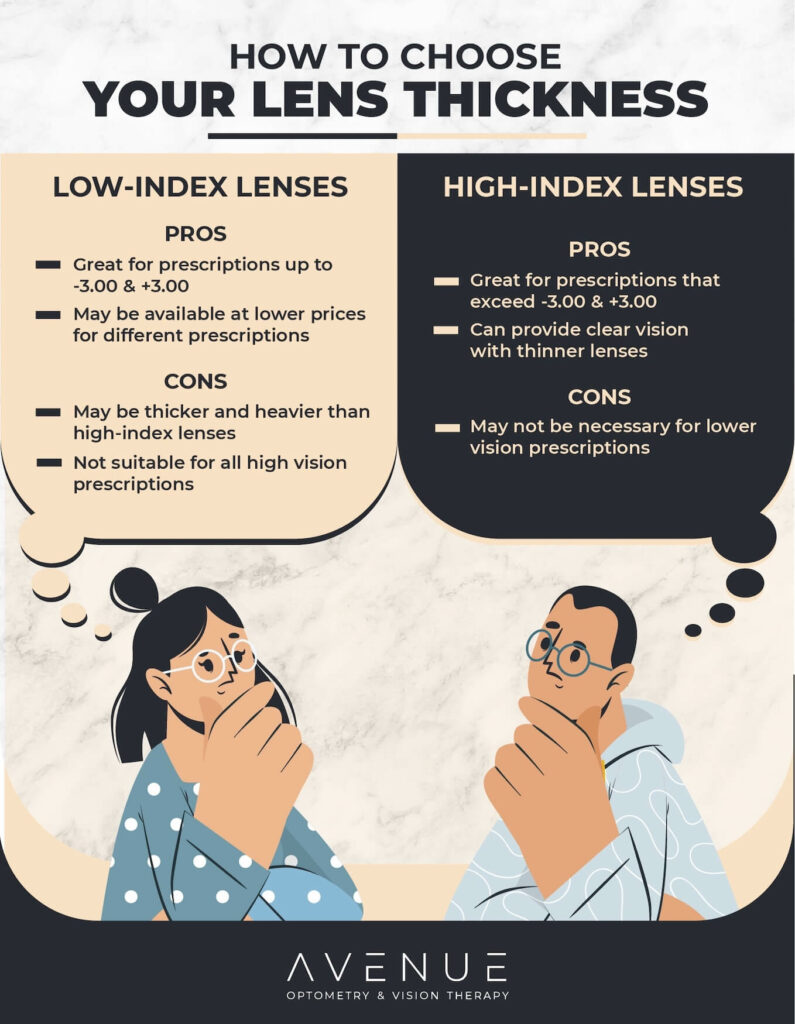How limited do you feel by your options for glasses frames because of how thick your lenses are? You might not have to settle for thick lenses.
Lens thickness is often determined by the lens index, which helps determine how thick or thin your lenses will be based on your prescription. The higher the lens index, the thinner the lenses.
Low-index lenses are often chosen for glasses with prescriptions greater than -3.00 or less than +3.00, while high-index lenses are better for stronger prescriptions to help achieve thinner and lighter glasses.
During an eye exam, your optometrist and optician can work with you to select a lens index that meets your needs for thickness and fits frames that suit your style.

Understanding Your Options for Lens Thickness
There’s a common misconception among glasses wearers that having a higher prescription means you’re stuck with a thick lens—but that’s not always the case.
While a higher prescription may generally require thicker lenses, you still have options for thinner lenses that provide clear vision. Knowing your options can help make finding a pair of comfortable glasses that suits your lifestyle and personality easier.
High-Index Lenses vs. Low-Index Lenses
The index of a lens generally refers to its ability to bend light. Lens indexes basically determine how thick your lenses will and can help make your glasses lighter and more comfortable:
- 1.5 index lenses: Also known as standard-index lenses, these lenses offer a reliable solution for mild to moderate prescriptions.
- 1.56–1.59 index lenses: Also known as mid-index lenses, these lenses are a popular choice for moderate prescriptions. They can be thinner and lighter, balancing thickness and affordability. They’re suitable for prescriptions ranging from -3.00 to +3.00.
- 1.61–1.74 index lenses: Also known as high-index lenses, these lenses are commonly used for stronger prescriptions and are designed to be thinner and lighter than standard lenses.
A high-index lens is generally thinner than a low-index lens with the same prescription, but it’s important to remember that even when you have higher-index lenses, your lenses may still be thicker than standard lenses.
Are Thicker Lenses More Powerful?
Yes and no. While thick lenses are generally a sign of glasses that provide a higher level of vision correction, they may not always have a stronger power than thinner lenses.
For example, someone with a slightly lower prescription and low-index lenses may have thicker, less powerful lenses than someone with a strong prescription and thinner, high-index lenses.
Why Are High Prescription Glasses So Thick?
In simple terms, when your eyes need more support for vision correction, your lenses need more material to effectively focus light on your retina. The material used for low-index lenses has less corrective power than high-index lens material, so low-index lenses for strong prescriptions need to be thicker.
With a higher corrective ability, high-index lenses can provide clear vision without using as much material for your lenses.
How Do You Choose the Right Lens Index?
The key factors to consider when choosing a lens index include:
- How you want your glasses to look and feel
- The cost of your lenses
- The frame you want for your glasses
- Your options based on your prescription
How Do You Want Your Glasses to Feel?
The way your lenses look and feel can affect how comfortable you are wearing your glasses—and how often you wear them. If you’re concerned about thick, heavy lenses, you may want to consider high-index lenses.
How Much Will Your Glasses Cost?
In general, high-index lenses can cost more than low-index lenses, but factors other than the lenses can also affect the total cost of a pair of glasses, including lens coatings, treatments, and frames.
What Kind of Frame Do You Want?
Not all frames fit all lenses. Your frame options may be limited if you require thicker, low-index lenses. If you want a fashionable frame, you may need thinner, high-index lenses.
What Are Your Options Based on Your Prescription?
Your lens index options depend on your prescription. Low-index lenses may not provide clear vision if you have a strong prescription. Likewise, if you have a less powerful prescription, standard-index lenses may be all you need to achieve clear, comfortable vision.

What Are the Benefits of Choosing High-Index Lenses?
For those with an especially low or high prescription, high-index lens materials can offer thinner and lighter lenses that still provide exceptional vision correction. Thinner, lighter lenses may be more comfortable than thicker lenses that put more pressure on your nose and ears.
Getting lenses you like the look of is also an important factor that shouldn’t be undervalued. If you want to avoid the “glass bottle effect” of thick lenses that jut out from your frames, high-index lenses can make it easier to get lenses that fit a frame you like without overshadowing how they look on your face.
You Can Get Help Picking Your Lenses
With so many lens options, it can be difficult to know where to start. Fortunately, you don’t have to make this choice alone.
As your eye care team, we’re not just dedicated to supporting your eye health. At Avenue Optometry & Vision Therapy, we’re also committed to helping you find glasses you love.
Book an appointment with our eye care team today, and let’s find your next pair of glasses!




